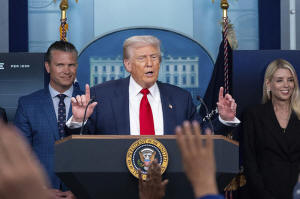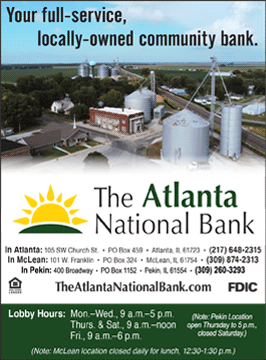Trump's Washington police takeover echoes history of racist narratives
about urban crime
[August 12, 2025]
By MATT BROWN
WASHINGTON (AP) — President Donald Trump has taken control of the
District of Columbia's law enforcement and ordered National Guard troops
to deploy onto the streets of the nation's capital, arguing the
extraordinary moves are in response to an urgent public safety crisis.
Even as district officials questioned the claims underlying his
emergency declaration, the president promised a "historic action to
rescue our nation’s capital from crime, bloodshed, bedlam and squalor
and worse." His rhetoric echoed that used by conservative politicians
going back decades who have denounced American cities, especially those
with majority non-white populations or led by progressive politicians,
as lawless or crime-ridden and in need of outside intervention.
“This is liberation day in D.C., and we’re going to take our capital
back,” Trump promised Monday.
Trump's action echoes uncomfortable historical chapters
But for many residents, the prospect of federal troops surging into the
district’s neighborhoods represents an alarming violation of local
agency. To some, it echoes uncomfortable historical chapters when
politicians used language to paint historically or predominantly Black
cities and neighborhoods with racist narratives to shape public opinion
and justify aggressive police action.
April Goggans, a longtime Washington resident and grassroots organizer,
said she was not surprised by Trump's actions. Communities had been
preparing for a potential federal crackdown in the district since the
summer of 2020, when Trump deployed National Guard troops during racial
justice protests after the murder of George Floyd.

“We have to be vigilant,” said Goggans, who has coordinated protests and
local civil liberties educational campaigns for nearly a decade. She
worries about what a surge in law enforcement could mean for residents'
freedoms.
“Regardless of where you fall on the political scale, understand that
this could be you, your children, your grandmother, your co-worker who
are brutalized or have certain rights violated,” she said.
Uncertainty about what's a safe environment raises alarms
According to White House officials, National Guard troops will be
deployed to protect federal assets in the district and facilitate a safe
environment for law enforcement to make arrests. The administration
believes the highly visible presence of law enforcement will deter
violent crime.
It is unclear how the administration defines providing a safe
environment for law enforcement to conduct arrests, raising alarm bells
for some local advocates.
“The president foreshadowed that if these heavy-handed tactics take root
here, they will be rolled out to other majority-Black and Brown cities,
like Chicago, Oakland and Baltimore, across the country,” said Monica
Hopkins, executive director of the American Civil Liberties Union’s D.C.
chapter.
“We’ve seen before how federal control of the D.C. National Guard and
police can lead to abuse, intimidation and civil rights violations —
from military helicopters swooping over peaceful racial justice
protesters in 2020 to the unchecked conduct of federal officers who
remain shielded from full accountability,” Hopkins said.
A history of denigrating language
Conservative lawmakers have for generations used denigrating language to
describe the condition of major American cities and called for greater
law enforcement, often in response to changing demographics in those
cities driven by nonwhite populations relocating in search of work or
safety from racial discrimination and state violence. Republicans have
called for greater police crackdowns in cities since at least the 1965
Watts Riots in Los Angeles.

President Richard Nixon won the White House in 1968 after campaigning on
a "law and order" agenda to appeal to white voters in northern cities
alongside overtures to white Southerners as part of his “Southern
Strategy.” Ronald Reagan similarly won both his presidential elections
after campaigning heavily on law and order politics. Politicians ranging
from former New York Mayor Rudy Giuliani to former President Bill
Clinton have cited the need to tamp down crime as a reason to seize
power from cities like Washington for decades.
[to top of second column]
|

President Donald Trump speaks with reporters in the James Brady
Press Briefing Room at the White House, Aug. 11, 2025, in
Washington, as Secretary of Defense Pete Hegseth, left, and Attorney
General Pam Bondi look on. (AP Photo/Alex Brandon, File)

District of Columbia Mayor Muriel Bowser called Trump’s takeover of the
local police force “unsettling” but not without precedent. The mayor
kept a mostly measured tone during a Monday news conference following
Trump’s announcement but decried the president’s reasoning as a
“so-called emergency” and said the district’s residents “know that
access to our democracy is tenuous.”
Trump threatened to “take over” and “beautify” the nation’s capital on
the campaign trail and claimed the district was “a nightmare of murder
and crime.” He also argued the city was “horribly run” and said his team
intended “to take it away from the mayor.” The president repeated
comments he’d previously made about some of the nation’s largest cities
during his news conference, including Baltimore, Chicago, Los Angeles,
Oakland, California, and his hometown of New York City. All are
currently run by Black mayors.
“You look at Chicago, how bad it is. You look at Los Angeles, how bad it
is. We have other cities in a very bad, New York is a problem. And then
you have, of course, Baltimore and Oakland. We don’t even mention that
anymore. They’re so far gone. We’re not going to let it happen,” he
said.
Civil rights advocates see the president’s rhetoric as part of a broader
political strategy.
“It’s a playbook he’s used in the past,” said Maya Wiley, CEO of the
Leadership Conference on Civil and Human Rights.
The president’s rhetoric "paints a picture that crime is out of control,
even when it is not true, then blames the policies of Democratic
lawmakers that are reform- and public safety-minded, and then claims
that you have to step in and violate people’s rights or demand that
reforms be reversed,” Wiley said.
She added that the playbook has special potency in the capital because
the district’s local law enforcement can be directly placed under
federal control, a power Trump invoked in his announcement.

Civil rights leaders denounce DC order as unjustified distraction
Trump’s actions in Washington and comments about other major American
cities sent shock waves across the country, as other cities prepare to
respond to potential federal action.
Democratic Maryland Gov. Wes Moore said Trump’s plan “lacks seriousness
and is deeply dangerous” in a statement and pointed to a 30-year-low
crime rate in Baltimore as a reason the administration should consult
local leaders rather than antagonize them. In Oakland, Mayor Barbara Lee
called Trump's characterization of the city “fearmongering.”
The administration already faced a major flashpoint between local
control and federal power earlier in the summer, when Trump deployed
National Guard troops to quell protests and support immigration
enforcement operations in Los Angeles despite opposition from California
Gov. Gavin Newsom and Los Angeles Mayor Karen Bass.
Civil rights leaders have denounced Trump's action in Washington as an
unjustified distraction.
“This president campaigned on ‘law and order,’ but he is the president
of chaos and corruption," said NAACP President Derrick Johnson. “There’s
no emergency in D.C., so why would he deploy the National Guard? To
distract us from his alleged inclusion in the Epstein files? To rid the
city of unhoused people? D.C. has the right to govern itself. It doesn’t
need this federal coup."
All contents © copyright 2025 Associated Press. All rights reserved |